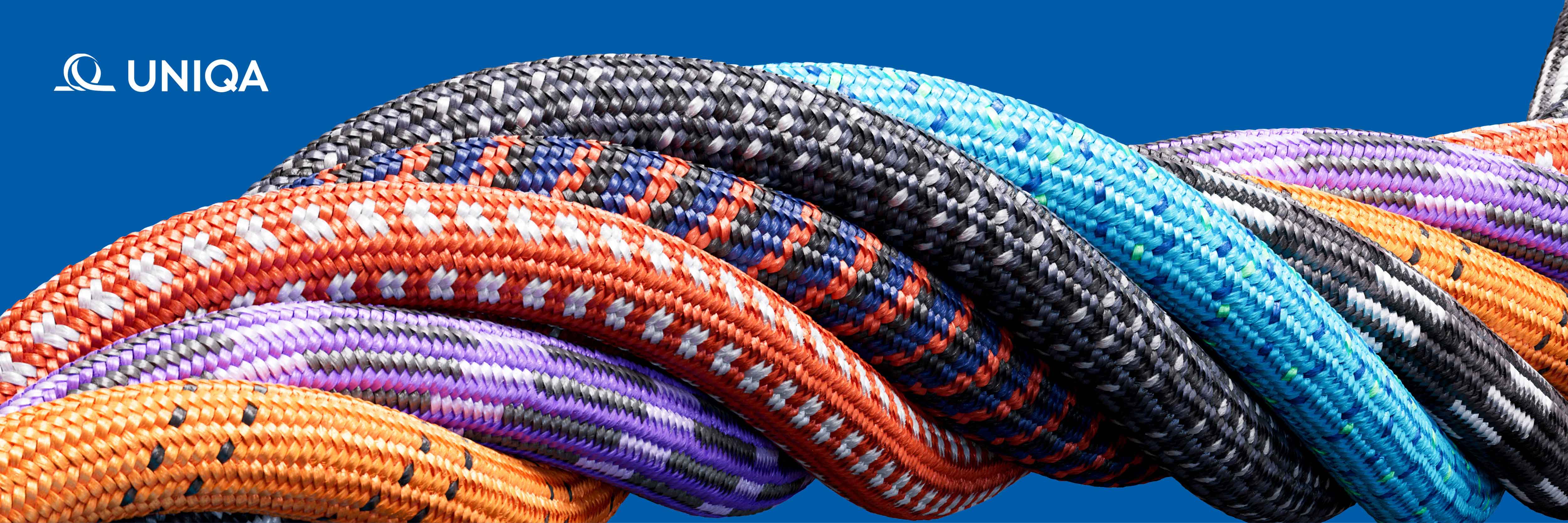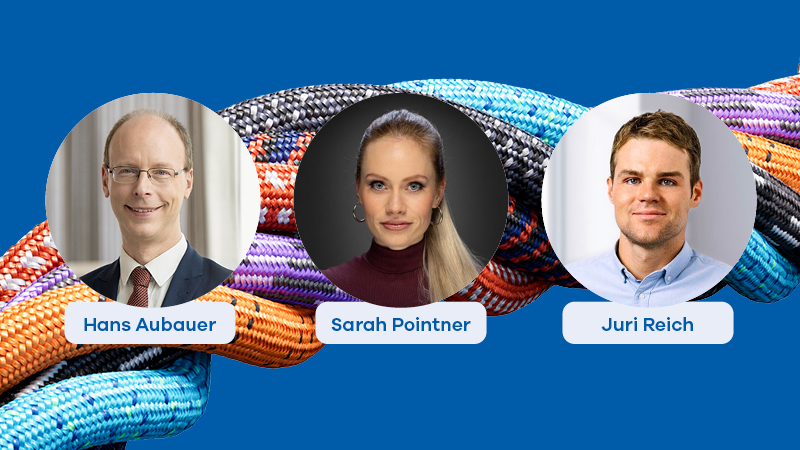
"Being regional means meeting people in the reality of their lives"
Read interview



Prevention is everything, state and private are mutually dependent and the international market is becoming more important: our new Head of Health Insurance Hans Aubauer, Juri Reich from Strategy & Transformation and VitalCoach Sarah Pointner on the megatrend of health and personal responsibility as the key to a personally and economically healthy future.
Hans: There is no one model in the sense that we orientate ourselves on or copy other providers. With the combination of insurance products and healthcare (from digital to hospital beds), we are creating an innovative ecosystem to protect and care for our customers - in the spirit of ‘living better together’. A key objective here is to strengthen prevention.
Juri: Speaking for Austria now, we have a high life expectancy, but we are ill for a long time. Scandinavia has more healthy life years and is an example in this respect. Prevention is crucial, both publicly and privately. We spend a relatively large amount of money on inpatient care and need to encourage people to take responsibility for themselves.
If you ask people what is most important to them, health is always one of the answers. Not everything changes. I believe that the importance of health will continue to increase.
Hans: Health is a long-term system and the challenge is to motivate people to take preventive action. Signing an insurance policy is not enough. That's why UNIQA and Mavie are creating a health ecosystem with many incentives and entry points.
Sarah: Many coaching customers have inhibitions - they shy away from the effort and find it difficult to stay on the ball. We are not yet as advanced as in the USA, where personal trainers are held in high regard and their support is taken for granted. That's why the programmes have to be low-threshold and anchored in the masses so that we can reach people well. My job as a coach is to work with clients to develop realistic and sustainable goals. In this way, I help them to take more responsibility for their own health and well-being.
Hans: With their interest in privately financed services, our customers are already taking steps on their own responsibility. However, we are faced with very different types of customers: From people who want to manage their own health, for example via blood tests, to people who prefer to be supported by coaches, to those customers who enjoy a stay in one of our VitalPlan hotels.
Juri: We always need offers for all levels of maturity, the home blood test is something for the more advanced. Information is also double-edged; if we cater to every customer expectation, we run the risk of falling prey to unscientific trends. It remains a balancing act.
Hans: People are living longer, medicine is improving, we are therefore experiencing more illnesses and we are better at identifying them. This gives us the opportunity to work on increasing the number of healthy life years.
Sarah: Today, there is more demand for individualised solutions than, say, 50 years ago. Someone sleeps badly, gets information - Instagram is the new doctor - makes their own diagnosis and expects a holistic analysis. The public system doesn't cover this, people feel they are being treated like a pawn.
Health is a long-term system and the challenge is to motivate people to take preventive action.
Sarah: Definitely. We coaches are increasingly becoming companions - a role that requires specialist knowledge, good argumentation and a high degree of empathy instead of an authoritarian demeanour. The role of doctors is also changing in this process.
Hans: Today, we have an interprofessional role model where many professional groups work together to optimise care. Teamwork is in demand, part-time work is often an issue, the demands, but also the requirements, have become significantly higher.
Hans: Telemedicine is a strategically important topic. As the market leader in health insurance, we have an innovative answer. In Austria, utilisation is still low, but it is growing steadily. Telemedicine is already being used intensively in other countries; in Poland, for example, we record hundreds of thousands of treatments per year.
Juri: This also has to do with how good the healthcare system was before. Poland has a lower density of doctors and therefore longer waiting times than Austria. Telemedicine has brought a great advantage there. Telemedicine is a quality improvement measure and an efficiency gain, a win-win, no matter where it is used.
Juri: You could learn and understand from the data and use it to guide patients through the system.
Hans: Data offers great opportunities to better support patients, but also in particular to develop new treatments or take suitable preventative steps. To do this, however, we need to record data in a more standardised way, overcome system boundaries and enable access. In Denmark, for example, it is a matter of course that treatment data is collected anonymously in a national data pool and made available for research.
Hans: I am sure that the state will continue to offer people basic care in ten, 20 or 30 years' time. But the options will increase rapidly and people's needs will also grow - private insurance will provide the right answers here.
Juri: But 100 per cent comprehensive cover from the state will not work. The state won't pay for the home blood test, that's our service. The state will also benefit from this, in terms of prevention. Risk incentivisation will be more important, as will personal responsibility.
Hans: Our advantage is that we are fast, efficient, dynamic and customer-orientated. We will deliver our value contribution, also in economic terms, and of course in business terms anyway. Economic approaches can make a big difference, especially in the healthcare sector. Let's allow the market economy here too.
Today, there is more demand for individualised solutions than, say, 50 years ago.
Hans: The systems are heterogeneous, but many of our products are an excellent fit. I can offer the Mavie home blood test everywhere. Telemedicine is a little more complicated in regulatory terms. But overall, we can say that prosperity is increasing in Central Europe. People are utilising private services without being privately insured. This harbours great potential for us.
Juri: If you ask people what is most important to them, health is always one of the answers. Not everything changes. I believe that the importance of health will continue to increase. In China, 30 years ago, hardly anyone was interested in air pollution. It's different now. As prosperity grows, health becomes more important.
Sarah: I also believe that the trend will continue and even intensify. If a person has non-specific back pain today, they are no longer satisfied with just treating the symptom. They look for the cause and specific solutions and increasingly recognise what they can do themselves.
Hans Aubauer was Managing Director at Accenture in Vienna before his career took him into the insurance industry. He was Director General first of the Social Insurance Institution for Trade and Industry (SVA), then of the Social Insurance for the Self-Employed (SVS. Since autumn 2024, he has been Head of Health Insurance and UNIQA Health Services GmbH at UNIQA and is a member of the Managing Board of Mavie Holding.
UNIQA VitalCoach Sarah Pointner is a sports scientist specialising in sports psychology / training therapy. She has completed training as a systemic coach and NLP practitioner and works part-time as a training therapist in a clinic for mental illness. In 2022, she took 3rd place at the Austrian Natural Bodybuilding & Fitness Federation (ANBF).
Juri Reich heads the Inhouse Consulting department in the Strategy and Transformation division. Like all members of his team, he has his professional roots in management consulting. Juri's work focusses on our Group-wide strategy as well as numerous other strategically relevant projects in various areas of the company.
Fotocredits: Zsolt Marton, Thomas Zinner, private
Read interview
Read article
Read article


.jpg)